高一年级英语学习计划表
上学期高一英语教学计划及进度表
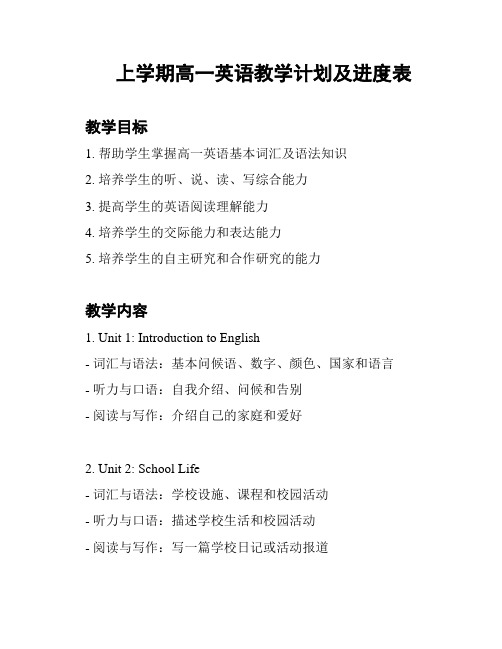
上学期高一英语教学计划及进度表
教学目标
1. 帮助学生掌握高一英语基本词汇及语法知识
2. 培养学生的听、说、读、写综合能力
3. 提高学生的英语阅读理解能力
4. 培养学生的交际能力和表达能力
5. 培养学生的自主研究和合作研究的能力
教学内容
1. Unit 1: Introduction to English
- 词汇与语法:基本问候语、数字、颜色、国家和语言
- 听力与口语:自我介绍、问候和告别
- 阅读与写作:介绍自己的家庭和爱好
2. Unit 2: School Life
- 词汇与语法:学校设施、课程和校园活动
- 听力与口语:描述学校生活和校园活动
- 阅读与写作:写一篇学校日记或活动报道
3. Unit 3: My Future Career
- 词汇与语法:职业和工作技能
- 听力与口语:谈论自己的职业规划和兴趣
- 阅读与写作:写一篇职业规划的短文
4. Unit 4: Leisure and Entertainment
- 词汇与语法:运动和娱乐活动
- 听力与口语:谈论兴趣爱好和休闲活动
- 阅读与写作:写一篇关于你最喜欢的娱乐活动的文章
5. Unit 5: Environmental Protection
- 词汇与语法:环境问题和保护
- 听力与口语:讨论环境问题和采取行动
- 阅读与写作:写一篇环保倡议的文章
教学进度表
以上是上学期高一英语教学计划及进度表,希望能够帮助学生达到预定的学习目标和提高英语综合能力。
请根据实际情况进行调整并及时备课,激发学生的学习兴趣和积极参与。
人教版英语高一艾宾浩斯单词复习计划表

短期复习计划周期
长期复习计划周期
30分 12小
5分钟 钟 时 1天 2天 4天 7天 15天 1个月 3个月 6个月
47 47 47 46 45 43 40 32 17
48 48 48 47 46 44 41 33 18
49 49 49 48 47 45 42 34 19
50 50 50 49 48 46 43 35 20
10 10 10 9 8 6 3
11 2020/10/2
11 11 11 10 9 7 4
12 2020/10/3
12 12 12 11 10 8 5
13 2020/10/4
13 13 13 12 11 9 6
14 2020/10/5
14 14 14 13 12 10 7
15 2020/10/6
15 15 15 14 13 11 8
75 75 75 74 73 71 68 60 45
76 76 76 75 74 72 69 61 46
77 77 77 76 75 73 70 62 47
78 78 78 77 76 74 71 63 48
79 79 79 78 77 75 72 64 49
80 80 80 79 78 76 73 65 50
28 2020/10/19
28 28 28 27 26 24 21 13
29 2020/10/20
29 29 29 28 27 25 22 14
30 2020/10/21
30 30 30 29 28 26 23 15
31 2020/10/22
31 31 31 30 29 27 24 16 1
32 2020/10/23
北师大版高一英语学习计划

北师大版高一英语学习计划IntroductionAs a new freshman at Beijing Normal University, I am excited to start my journey with the NBU High School English program. This study plan aims to outline my goals and strategies for mastering the English language over the next academic year. By setting realistic objectives and implementing effective study habits, I am confident that I will be able to improve my English proficiency and succeed in my future academic and professional endeavors.Goals1. Improve my overall English language proficiency in reading, writing, speaking, and listening.2. Enhance my vocabulary and grammar skills to express myself more fluently and accurately.3. Develop critical thinking and analytical skills through the study of English literature and academic texts.4. Prepare for standardized English tests, such as the TOEFL or IELTS, to demonstrate my language proficiency for future academic pursuits.5. Cultivate a love for the English language and literature through engaging and enjoyable learning experiences.Strategies1. Regular English PracticeI plan to practice English daily through various activities, such as reading English news articles, listening to English podcasts, and engaging in English conversations with classmates and teachers. I will also make use of language learning apps and websites to reinforce my language skills.2. Vocabulary and Grammar StudyTo improve my vocabulary and grammar, I will set aside dedicated time each week to learn new words, phrases, and grammar rules. I will create flashcards, use vocabulary building apps, and practice writing and speaking exercises to consolidate my understanding and usage of English words and structures.3. Reading English LiteratureI aim to read a variety of English literature, including classic novels, contemporary fiction, and academic texts. This will not only improve my reading comprehension but also exposeme to different writing styles and cultural perspectives. I will also participate in book discussions and writing workshops to develop my analytical and critical thinking skills.4. Writing PracticeTo enhance my writing skills, I plan to write regularly in English. This will include composing essays, journal entries, and creative pieces. I will seek feedback from my teachers and peers to identify areas for improvement and refine my writing style. Additionally, I will familiarize myself with different writing formats, such as academic essays and research papers, to prepare for future academic requirements.5. Speaking and Listening ExercisesI will actively participate in English-speaking activities, such as debates, presentations, and group discussions. This will help me improve my oral communication skills, pronunciation, and fluency. I will also practice listening to English audio materials, such as lectures, podcasts, and interviews, to enhance my listening comprehension and understanding of natural speech patterns.6. Test PreparationIn preparation for standardized English tests, I will allocate time to practice test-taking strategies and familiarize myself with the test format and content. I will also take mock tests to assess my progress and identify areas that require further improvement. Additionally, I will seek guidance from teachers and utilize test preparation resources to enhance my test readiness.7. Engaging with English CultureI will actively engage with English culture by watching English movies and TV shows, listening to English music, and exploring English-speaking countries' history and cultural practices. This will help me develop a deeper appreciation for the language and its cultural significance, which will further motivate me to excel in my English studies.TimelineI have divided my study plan into semesters, with specific goals and tasks for each period. First Semester (September - January)- Establish a daily English practice routine- Learn 20 new English words and review grammar rules weekly- Read 2 English novels and 4 academic articles- Write 3 essays and participate in writing workshops- Participate in 2 English-speaking activities per month- Begin test preparation for standardized English testsSecond Semester (February - June)- Expand vocabulary and grammar knowledge with 30 new words and 2 grammar exercises weekly- Read 3 English novels and 6 academic articles- Write 5 essays and engage in peer feedback sessions- Participate in 3 English-speaking activities per month- Continue test preparation and take mock tests periodicallyEvaluationTo monitor my progress and adjust my study plan as needed, I will regularly assess my English language proficiency through various means, including:1. Self-assessment of language skills in reading, writing, speaking, and listening2. Periodic quizzes and tests administered by English teachers3. Feedback from peers and teachers on my writing and speaking abilities4. Practice tests for standardized English exams, with emphasis on improvement in scores and test-taking strategiesConclusionBy following this study plan, I am confident that I will make significant strides in improving my English language proficiency and achieving my academic and personal goals. With dedication, perseverance, and a love for the English language, I look forward to embracing the challenges and rewards of learning English at Beijing Normal University.References:1. Huang, M. (2021). Strategies for English Language Learners: A Practical Guide. Beijing: NBU Press.2. Smith, J. (2019). The Power of Reading: How Literature Can Improve Language Skills. New York: Pearson Education.3. Wilson, L. (2018). Mastering English: A Comprehensive Guide to Language Learning. London: Oxford University Press.。
高中英语老师学习计划表

高中英语老师学习计划表前言英语是一门重要的语言,也是一门撑起人类交流桥梁的语言,尤其在全球化的今天,英语已经成为了国际通用语言,在学生的学习过程中也扮演了重要的角色。
因此,高中英语教师需要不断提高自己的语言水平并掌握教学技能,以更好地完成教学工作。
下面就是我制定的高中英语老师学习计划表。
学习计划本次学习计划共分为三个阶段,分别是基础阶段、进阶阶段和深入阶段。
每个阶段的时间为2个月,每个月的学习任务都不同,旨在全面提高英语语言能力和教学技巧。
基础阶段时间:2021年9月1日-2021年10月31日本阶段主要任务是在英语语言基础上提高听、说、读、写四项能力,并逐步形成自己的教学方法与技巧。
1.语法知识掌握:达到包括时态、语态、语气等在内的基础语法知识掌握2.阅读:每周至少阅读一篇英文文章,提高语言理解能力3.听力:每天练习听力,能够听懂基本的口语对话4.口语:每周练习口语,能够使用简单的句子和表达方式5.写作:每周至少写一篇英文文章,提升写作技巧进阶阶段时间:2021年11月1日-2022年1月1日本阶段主要任务是加强英语基础知识的运用以及掌握更多的教学技巧,在课程设计上更加独立和丰富,能够有效提高教学效果。
1.语言技巧:对困难语法点进行课程设计和教学,如虚拟语气、倒装句等2.阅读:每周阅读至少两篇英文文章,并制作阅读课程设计3.听力:每日练习听力,并掌握快速提取信息的技巧4.口语:采用真实情景模拟进行口语练习,并能够指导学生自主策划5.写作:每周写作一篇小论文或者散文,对学术论文写作进行设计,并补充教学案例深入阶段时间:2022年1月1日-2022年3月1日本阶段主要任务是掌握高阶英语知识,注重讲究语言的细致处理,能够针对学生存在的问题设计多样教学模式与实用课程。
1.语言技巧:掌握高阶语法点的课程设计与教学,从英美文化与社会制度分析入手,设计多角度教学案例2.阅读:每周阅读一本英语小说,对其进行表达分析,并引导学生开展主题式阅读。
高中英语学习计划表

高中英语学习计划表(经典版)编制人:__________________审核人:__________________审批人:__________________编制单位:__________________编制时间:____年____月____日序言下载提示:该文档是本店铺精心编制而成的,希望大家下载后,能够帮助大家解决实际问题。
文档下载后可定制修改,请根据实际需要进行调整和使用,谢谢!并且,本店铺为大家提供各种类型的经典范文,如公文写作、报告体会、演讲致辞、党团资料、合同协议、条据文书、诗词歌赋、教学资料、作文大全、其他范文等等,想了解不同范文格式和写法,敬请关注!Download tips: This document is carefully compiled by this editor. I hope that after you download it, it can help you solve practical problems. The document can be customized and modified after downloading, please adjust and use it according to actual needs, thank you!In addition, this shop provides you with various types of classic sample essays, such as official document writing, report experience, speeches, party and group materials, contracts and agreements, articles and documents, poems and songs, teaching materials, essay collections, other sample essays, etc. Learn about the different formats and writing styles of sample essays, so stay tuned!高中英语学习计划表高中英语学习计划表(精选10篇)高中英语学习计划表篇1学习和做事是一样的,想要学好一门学科是需要我们在平时的学习中定制计划,使自己的成绩提高,这样我们才能在考试中取得好成绩。
高一学习计划详细安排
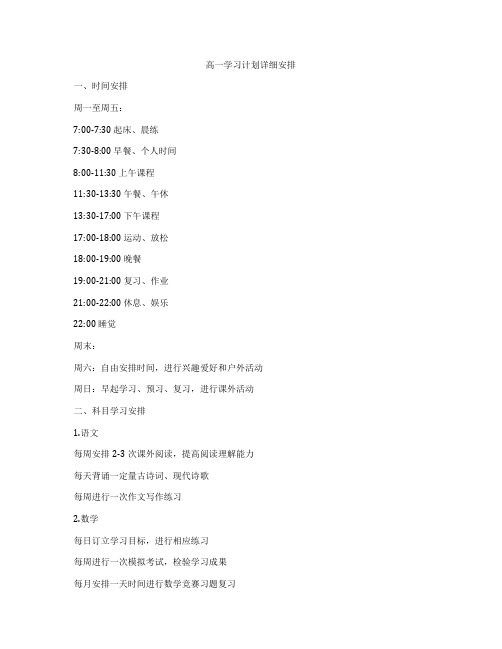
高一学习计划详细安排一、时间安排周一至周五:7:00-7:30 起床、晨练7:30-8:00 早餐、个人时间8:00-11:30 上午课程11:30-13:30 午餐、午休13:30-17:00 下午课程17:00-18:00 运动、放松18:00-19:00 晚餐19:00-21:00 复习、作业21:00-22:00 休息、娱乐22:00 睡觉周末:周六:自由安排时间,进行兴趣爱好和户外活动周日:早起学习、预习、复习,进行课外活动二、科目学习安排1.语文每周安排2-3次课外阅读,提高阅读理解能力每天背诵一定量古诗词、现代诗歌每周进行一次作文写作练习2.数学每日订立学习目标,进行相应练习每周进行一次模拟考试,检验学习成果每月安排一天时间进行数学竞赛习题复习3.英语每天背诵一篇短文、一则英语新闻每周进行一次听力练习每月进行一次英语口语表达比赛4.物理每周进行一次实验课学习每天复习当日学习内容每周安排一次小测验,检验掌握情况5.化学每周进行一次实验课学习每天复习当日学习内容每周安排一次小测验,检验掌握情况6.生物每周进行一次实验课学习每天复习当日学习内容每周安排一次小测验,检验掌握情况7.历史每周进行一次历史研讨活动每日背诵历史要点、重要事件每月进行一次历史知识竞赛8.地理每周进行一次地理实地考察每日复习当日学习内容每周安排一次小测验,检验掌握情况9.政治每周进行一次政治研讨活动每日背诵政治要点、重要事件每月进行一次政治知识竞赛三、学习方法1.分层次学习将学习内容按照重要性和难易程度进行分层次学习,科学合理安排学习进度。
2.整理学习资料将老师上课所讲内容及时整理成笔记,方便日后复习使用。
并适时整理课外学习资料,拓展知识面。
3.刻意练习循序渐进,多次练习,将知识内化,形成技能。
4.重点突破针对每个科目的重点难点进行有针对性复习,确保重点知识掌握。
5.合理安排复习时间根据每个科目重难点和当周的课程安排,合理安排复习时间,充分利用时间提高学习效率。
高一学习计划英语

高一学习计划英语IntroductionHigh school is a crucial stage in a student's academic journey. It is a time when students have to not only focus on their studies but also start thinking about their future career and higher education. Developing a strategic study plan is essential for high school students to excel academically and prepare themselves for the challenges ahead. In this study plan, we will outline the strategies and resources that high school students can utilize to enhance their learning experience and achieve their academic goals.Goal SettingThe first step in developing a study plan is to set clear and achievable academic goals. High school students should take the time to assess their strengths and weaknesses and identify areas for improvement. This could include subjects they struggle with or skills they want to develop. Once these areas have been identified, students can set specific, measurable, achievable, relevant, and time-bound goals (SMART goals) to work towards. For example, a student might set a goal to improve their math grade from a B to an A by the end of the semester or to develop better time management skills to balance schoolwork and extracurricular activities.Time ManagementTime management is essential for high school students to juggle their academic responsibilities, extracurricular activities, and personal commitments. Students should create a weekly schedule that allocates specific time slots for studying, homework, sports, clubs, and relaxation. It is also important to prioritize tasks based on their urgency and importance. By managing their time effectively, students can reduce stress, avoid procrastination, and stay organized throughout the school year.Subject-specific Study StrategiesDifferent subjects require different study strategies. High school students should identify the best study methods for each subject to maximize their learning and retention of information.English Language Arts: Reading comprehension and writing skills are essential for success in high school. Students can improve their reading comprehension by actively engaging with the text, taking notes, and discussing the material with peers. To enhance their writing skills, students should practice writing essays, stories, and analytical pieces. Grammar and vocabulary exercises can also help strengthen language skills.Mathematics: Math is a subject that many students struggle with, but with the right study techniques, they can improve their understanding and performance. Practice is crucial formastering math concepts, so students should solve as many problems as possible and seek help from teachers or tutors when they encounter difficulties.Science: Science subjects, including biology, chemistry, and physics, require a strong understanding of scientific principles and experimentation. High school students should conduct hands-on experiments, take thorough notes, and review the material frequently to excel in science classes.Social Studies: Social studies cover a wide range of topics, including history, geography, and civics. To succeed in these subjects, students should immerse themselves in the material by reading, watching documentaries, and actively participating in class discussions and debates.Foreign Languages: Learning a foreign language requires consistent practice and exposure to the language. High school students should practice speaking, listening, reading, and writing in the target language to improve their fluency and comprehension.Study ResourcesThere are numerous resources available to high school students to support their learning and academic success. These resources include:Textbooks: High school students should utilize their textbooks as a primary source of information and study guides for exams.Online Resources: The internet is a treasure trove of educational resources, including educational websites, online tutorials, and digital libraries. Students can access these resources to supplement their learning and gain a deeper understanding of their subjects.Tutoring: Professional tutoring services can provide personalized support to students who need extra help in specific subjects.Study Groups: Studying with peers can be beneficial for high school students, as they can discuss concepts, share notes, and quiz each other. Collaborative learning can enhance understanding and retention of material.Educational Apps: There is a wide range of educational apps available for smartphones and tablets that can help students with everything from organization to subject-specific learning. Exam PreparationHigh school students will encounter various types of exams, including quizzes, tests, midterms, finals, and standardized assessments such as the SAT and ACT. To prepare for these exams, students should engage in regular and thorough review of the material, practice previous exam questions, and seek help from teachers or tutors if needed. It is also advisable for students to develop effective test-taking strategies, such as time management, multiple choice tactics, and essay writing skills.Extra-curricular ActivitiesEngaging in extracurricular activities is beneficial for high school students, as it helps them develop various skills, build social networks, and enhance their college applications. However, it is important for students to balance their extracurricular commitments with their academic responsibilities. High school students should carefully select extracurricular activities that align with their interests and goals, and they should actively manage their time to ensure that their studies are not compromised.College PreparationHigh school is a critical time for college preparation. Students should take the time to research college options, explore potential majors, and develop a plan for college admissions. This may involve taking rigorous courses, participating in extracurricular activities, and preparing for standardized tests. Additionally, students should seek guidance from school counselors, attend college fairs and information sessions, and engage in volunteer work or internships to strengthen their college applications.ConclusionHigh school can be a demanding and challenging time for students, but with a well-structured study plan and the right resources, they can achieve academic success and excel in their chosen fields. By setting clear goals, managing their time effectively, utilizing subject-specific study strategies, and accessing relevant resources, high school students can pave the way for a bright future and achieve their academic and career aspirations.。
高一学习计划表
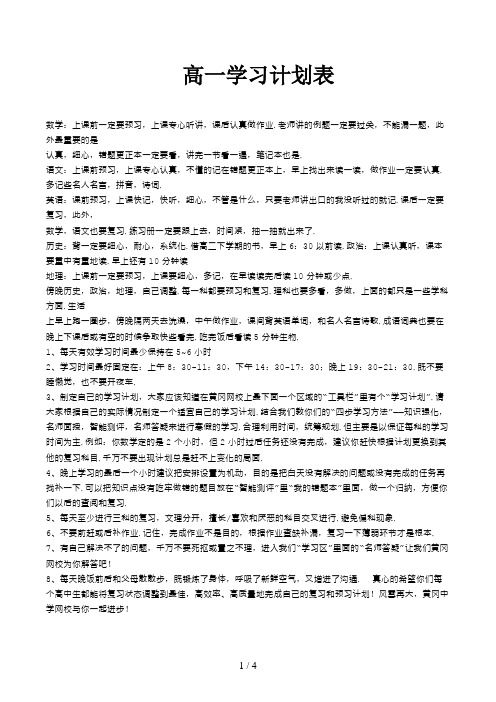
高一学习计划表数学:上课前一定要预习,上课专心听讲,课后认真做作业.老师讲的例题一定要过关,不能漏一题,此外最重要的是认真,细心,错题更正本一定要看,讲完一节看一遍,笔记本也是.语文:上课前预习,上课专心认真,不懂的记在错题更正本上,早上找出来读一读,做作业一定要认真.多记些名人名言,拼音,诗词.英语:课前预习,上课快记,快听,细心,不管是什么,只要老师讲出口的我没听过的就记.课后一定要复习,此外,数学,语文也要复习.练习册一定要跟上去,时间紧,抽一抽就出来了.历史:背一定要细心,耐心,系统化.借高二下学期的书,早上6:30以前读.政治:上课认真听,课本要重中有重地读.早上还有10分钟读地理:上课前一定要预习,上课要细心,多记,在早读读完后读10分钟或少点.傍晚历史,政治,地理,自己调整.每一科都要预习和复习.理科也要多看,多做,上面的都只是一些学科方面.生活上早上跑一圈步,傍晚隔两天去洗澡,中午做作业,课间背英语单词,和名人名言诗歌.成语词典也要在晚上下课后或有空的时候争取快些看完.吃完饭后看读5分钟生物.1、每天有效学习时间最少保持在5~6小时2、学习时间最好固定在:上午8:30-11:30,下午14:30-17:30;晚上19:30-21:30.既不要睡懒觉,也不要开夜车.3、制定自己的学习计划,大家应该知道在黄冈网校上最下面一个区域的“工具栏”里有个“学习计划”.请大家根据自己的实际情况制定一个适宜自己的学习计划.结合我们教你们的“四步学习方法”——知识强化,名师面授,智能测评,名师答疑来进行寒假的学习.合理利用时间,统筹规划.但主要是以保证每科的学习时间为主.例如:你数学定的是2个小时,但2小时过后任务还没有完成,建议你赶快根据计划更换到其他的复习科目.千万不要出现计划总是赶不上变化的局面.4、晚上学习的最后一个小时建议把安排设置为机动,目的是把白天没有解决的问题或没有完成的任务再找补一下.可以把知识点没有吃牢做错的题目放在“智能测评”里“我的错题本”里面,做一个归纳,方便你们以后的查阅和复习.5、每天至少进行三科的复习,文理分开,擅长/喜欢和厌恶的科目交叉进行.避免偏科现象.6、不要前赶或后补作业.记住,完成作业不是目的,根据作业查缺补漏,复习一下薄弱环节才是根本.7、有自己解决不了的问题,千万不要死抠或置之不理,进入我们“学习区”里面的“名师答疑”让我们黄冈网校为你解答吧!8、每天晚饭前后和父母散散步,既锻炼了身体,呼吸了新鲜空气,又增进了沟通.真心的希望你们每个高中生都能将复习状态调整到最佳,高效率、高质量地完成自己的复习和预习计划!风雪再大,黄冈中学网校与你一起进步!与初中相比,高中的学习有一些新的特点:①知识量大;②学科内容深,学科知识的抽象概括性强,需要掌握大量的科学概念、公式、定理、定律;③综合性、系统性强,要理解或解决一个问题,往往需要综合运用各学科知识.高中生每天要学的内容很多,如果不分先后顺序和轻重缓急,就会手忙脚乱、丢三落四,本来能学好的东西也学不好,这就需要制定一个学习计划,每天运用计划促进学习目标的实现,磨炼意志力,养成良好的学习习惯并且提高学习效率,减少时间浪费.每个人的具体情况不同,学习计划也应该因人而异,但在制定计划时应注意以下几点:黄金时间来记忆首先应该抓住记忆效果最佳的时间段来安排记忆,提高效率.一般而言,早上6:00–7:00头脑清醒,记忆效果比较好,上午、下午都有课程安排学习比较紧张,中午休息30–50分钟可以缓解疲劳,以便下午有充沛的精力学习.而每天如果不能保证7–8小时睡眠,记忆效果也会降低.尊重自己生物钟由于生理条件和生活环境、习惯的不同,人们的生活节律和最佳感觉也往往不尽相同.有的人的学习最佳时间在上午,有的人在下午,还有的同学感觉晚上学习效率最高.在了解了自己的最佳学习时段之后,按照它来安排自己的学习和休息.将最重要的事情放在最佳感觉时间去做,就会取得事半功倍的效果.学习要有时间限制为了提高效率,在制定计划时,要适当给自己“压力”,对每一科目的预习和复习要做到三限制:即限定时间、限定速度、限定准确率.这种目标明确,有压力的学习,可以使注意力高度集中,提高复习效率.同时,每学习完一部分时,都有一种轻松感、愉悦感,会更充满信心地复习下去.对照计划反省计划一旦制定,就要雷打不动地完成,如有完不成的,也应立即在次日加倍补上.如:反省自己,当天的计划完成了没有,明天先干什么?再干什么?如果完成的好时可奖励自己一次;如果完成的不好时可惩罚自己一次.这样做,既有约束力又有可操作性,每天都会感到在进步.一段时间后,还应该根据自己的学习情况,对计划做出进一步完善,使其更好地促进学习.公开学习计划少数高中生缺乏自我约束能力,这样的同学在制定学习计划后,最好向家长、老师或者同学宣布.这样做一方面会起到监督作用,也会起到一个强迫约束效果,当自己不能坚持时,马上就会想到:“是否别人会笑话自己意志薄弱”或者“太没出息了”,因此就能坚持到底,“无论如何,一定要坚持实行自己的计划”.关于理科的复习与练习,首先是公式,对公式要非常熟悉,公式中每个字母的含义,公式的推导,公式的使用对象,这些是很重要的,从现在开始,把各科所有公式分类并用一个本子整理一遍,做题的时候强化这些公式的记忆与使用,做到看到题目就知道要用到什么公式,以及清楚公式中字母对应的数字,在平时做练习题时,就要要求自己写出题目已知什么,未知什么,求什么,相关公式,这些都清楚了在解答.考试时当然不用写出来,但自己必须清楚.关于化学:把整本书的所有化学方程式抄一遍到本子上,有时间就写一写,要能相当熟练的写出他们,记住并熟悉那几个特殊的,同时知道每个化学反应的现象,包括颜色,气味,形态等的变化,还有就是记住化学物的颜色,状态,气味,比如哪些物质是固体,白色沉淀有哪些..关于数学:整理方程,公式,不是整理出来就可以,主要是熟知如何使用他们,熟悉函数图像,能准确的画出图像,并灵活运用图像,有时不会计算画个图就能知道答案.关于物理:分类整理公式,熟悉并能运用,做题时要理解题目描述的过程.科学的、实际的个人学习计划.一定能提高学习成绩早上6点-8点:一日之计在于晨,对一般人来说,疲劳已消除,头脑最清醒,体力亦充沛,是学习的黄金时段.可安排对功课的全面复习.早上8点-9点:据试验结果显示,此时人的耐力处于最佳状态,正是接受各种“考验”的好时间.可安排难度大的攻坚内容.上午9点-11点:试验表明这段时间短期记忆效果很好.对“抢记”和马上要考核的东西进行“突击”,可事半功倍.正午13点-14点:饭后人易疲劳,夏季尤其如此.休息调整一下,养精蓄锐,以利再战.最好休息,也可听轻音乐.但午休切莫过长.下午15点-16点:调整后精神又振,试验表明,此时长期记忆效果非常好.可合理安排那些需“永久记忆”的东西.傍晚17点-18点:试验显示这是完成复杂计算和比较消耗脑力作业的好时间.这段时间适宜做复杂计算和费劲作业.晚饭后:应根据各人情况妥善安排.可分两三段来学习,语、数、外等文理科交叉安排;也可作难易交替安排.以下是一位高考优秀考生的每日作息时间表,可供参考:呵呵 .语文英语为记忆性知识,估计贵校会分配晨读,语文靠自己的阅读,英语为语法+单词(高中背单词很重要),既然你以后走理科路线,那么你要着重将物理知识学好.在高三上学期你就回知道,理科靠物理.物理靠基础,如果你高一搞不好物理,基本上可以说你理科会残废了.不要将历史地理政治看很重,你选择理科路,文科知识你在上课就能做好.即使高一有这三科拖你后腿致使你整体成绩不佳也无所谓,因为你有杀手锏——强悍的理科知识.忘记说一点了,做笔记很重要很重要,笔记不是抄课本知识点,而是总结知识点,将老师出题的不同解法记录下来、自己试卷批改后不要珍惜,将里面经典题目用小刀剪切贴在笔记上,在在下面做出解法.以后考试前2遍课本+3遍笔记(其实笔记应该是没事就翻看看的),而且到高三的时候也会用到..说了这么多我的总结就是:抓住课上+课下适度复习(不用花费太多时间)+阅读好书+背单词+记笔记,常翻阅.篇二:高一的学习计划高一的学习计划与初中相比,高中的学习有一些新的特点:①知识量大;②学科内容深,学科知识的抽象概括性强,需要掌握大量的科学概念、公式、定理、定律;③综合性、系统性强,要理解或解决一个问题,往往需要综合运用各学科知识.高中生每天要学的内容很多,如果不分先后顺序和轻重缓急,就会手忙脚乱、丢三落四,本来能学好的东西也学不好,这就需要制定一个学习计划,每天运用计划促进学习目标的实现,磨炼意志力,养成良好的学习习惯并且提高学习效率,减少时间浪费.每个同学的具体情况不同,学习计划也应该因人而异,但在制定计划时应注意以下几点:黄金时间来记忆同学们应该抓住记忆效果最佳的时间段来安排记忆,提高效率.一般而言,早上6:00–7:00头脑清醒,记忆效果比较好,上午、下午都有课程安排学习比较紧张,中午休息30–50分钟可以缓解疲劳,以便下午有充沛的精力学习.而每天如果不能保证7–8小时睡眠,记忆效果也会降低.尊重自己生物钟由于生理条件和生活环境、习惯的不同,人们的生活节律和最佳感觉也往往不尽相同.有的人的学习最佳时间在上午,有的人在下午,还有的同学感觉晚上学习效率最高.在了解了自己的最佳学习时段之后,按照它来安排自己的学习和休息.将最重要的事情放在最佳感觉时间去做,就会取得事半功倍的效果.学习要有时间限制为了提高效率,在制定计划时,要适当给自己“压力”,对每一科目的预习和复习要做到三限制:即限定时间、限定速度、限定准确率.这种目标明确,有压力的学习,可以使注意力高度集中,提高复习效率.同时,每学习完一部分时,都有一种轻松感、愉悦感,会更充满信心地复习下去.对照计划反省计划一旦制定,就要雷打不动地完成,如有完不成的,也应立即在次日加倍补上.如:反省自己,当天的计划完成了没有,明天先干什么?再干什么?如果完成的好时可奖励自己一次;如果完成的不好时可惩罚自己一次.这样做,既有约束力又有可操作性,每天都会感到在进步.一段时间后,还应该根据自己的学习情况,对计划做出进一步完善,使其更好地促进学习.公开学习计划少数高中生缺乏自我约束能力,这样的同学在制定学习计划后,最好向家长、老师或者同学宣布.这样做一方面会起到监督作用,也会起到一个强迫约束效果,当自己不能坚持时,马上就会想到:“是否别人会笑话自己意志薄弱”或者“太没出息了”,因此就能坚持到底,“无论如何,一定要坚持实行自己的计划”.●高中生应该养成的十大学习习惯高中学习是一个系统的过程,它不像初中的课程,可以凭借小聪明在考试前突击一下就把成绩提上去,对于难度更大、覆盖面更广的高中内容来说,预习、听课、复习、作业、笔记等等都是必不可少的环节,不但这样,还有一些习惯性的做法需要培养,高中生应当尽早养成良好的学习习惯,按部就班地跟着课程进度学习.1、认真预习的习惯很多同学只重视课堂上认真听讲,课后完成作业,而忽视课前预习,有的同学根本没有预习,其中最主要的原因不是因为没有时间,而是因为没有认识到期预习的重要性.那么预习有什么样好处呢?课前预习也是学习的重要环节,预习可以扫除课堂学习的知识障碍,提高听课效果;还能够复习、巩固已学的知识,最重要的是能发展学生的自学能力,减少对老师的依赖,增强独立性;预习可以加强记课堂笔记的针对性,改变学习的被动局面.在预习时,要做到:了解教材的大概内容与前面已学的知识框架;找出本章或本课内容与前面已学知识的联系,找出所需的旧知识,并补习此时的知识;找出本课的难点和重点(作为听课的重点);对重点问题和自己不理解的问题,用笔划或记入预习笔记.2、专心听课的习惯如果课前没有一个“必须当堂掌握”的决心,会直接影响到听讲的效果,如果在每节课前,学生都能自觉要求自己“必须当堂掌握”,那么上课的效率一定会大大提高.实际上,有相当多的学生认为,上课听不懂没有关系,反正有书,课下可以看书.抱有这种想法的学生,听课时往往不求甚解,或者稍遇听课障碍,就不想听了,结果浪费了上课的宝贵时间,增加了课下的学习负担,这大概正是一部分学生学习负担的重要原因.集中注意力听课是非常重要的,心理学告诉我们注意是心理活动对一定对象的指向和集中,它是心理过程的动力特征.注意的指向性,可使人的心理活动在每一瞬间都能有选择的反映事物;注意的集中性,可使事物在人脑中获得清晰和深刻的反映.正因为注意拥有指向性和集中性两个重要的特征,所以,注意具有选择、保持以及对活动的调节和监督的功能.思路就是思考问题的线索.上课听讲一定要理清思路.要把老师在讲课时运用的思维形式、思维规律和思维方法理篇三:高中生学习计划表模板。
高一英语第二学期计划

高一英语第二学期计划English Answer:Unit 1: Exploring Identity.Learning Objectives:Analyze literary texts that explore themes of identity and belonging.Identify and compare different perspectives on identity formation.Develop critical thinking and analytical skills through close reading and discussion.Essential Questions:How do we define and construct our own identities?How do our identities intersect with and shape our experiences?What role do society and culture play in shaping our understanding of identity?Unit 2: Language and Communication.Learning Objectives:Analyze the structure and function of language in various contexts.Develop skills in critical reading, listening, speaking, and writing.Explore the power of language to convey ideas, influence behavior, and connect people.Essential Questions:How does language shape our perceptions andunderstanding of the world?How can we use language effectively to communicate our ideas and build relationships?What are the ethical considerations involved in language use?Unit 3: Power, Politics, and Social Justice.Learning Objectives:Analyze historical and contemporary texts that explore issues of power, politics, and social justice.Identify and evaluate different perspectives on these issues.Develop skills in critical reading, research, and argumentation.Essential Questions:How do power and politics influence our lives?What is social justice, and how can we promote it?How can we use our voices to speak out against injustice and advocate for change?Unit 4: Culture and Global Issues.Learning Objectives:Analyze different cultures and their impact on global issues.Evaluate the connections between local and global events.Develop skills in cultural analysis, research, and presentation.Essential Questions:How do cultures shape our values, beliefs, and behaviors?What are the major global issues facing our world today?How can we foster intercultural understanding and cooperation to address these issues?Assessment Plan:Formative Assessments:Class discussions, quizzes, short writing assignments, projects.Summative Assessments:Unit exams, essays, presentations, research projects.Timeline:First Quarter: Unit 1 and Unit 2。
高一在家自学计划安排表

高一在家自学计划安排表随着新冠肺炎疫情不断发展,采取自学和网上学习的教育模式已成为普遍现象。
2020年4月1日至6月30日,江苏省高中生作为防疫“特殊时期”开展自主学习。
在此期间,学校会制定出一份自学计划,安排学生有条不紊地学习,这里将提出针对高一的自主学习计划安排表:一、时间安排1. 上午8:00-8:30:唯美语文。
在这段时间里,学生应该花一些时间阅读一些古典名篇,既能够学习语言表达,又能够获得文化素养;2. 上午8:30-9:00:数学。
学生应该花一些时间系统性地复习数学,从基础题型入手,反复强化巩固。
3. 上午9:00-9:30:英语。
学生应该把时间花在英语上,首先复习词汇,然后阅读一些英文经典文章,增强自己的阅读能力;4. 上午9:30-10:00:体育锻炼。
为了保持身体健康,在这段时间应该进行一些有氧运动,这样能够保持身体的健康;5. 上午10:00-10:30:在家作业。
在这段时间学生可以把作业做完,在家学习,这样可以提高学习效果,同时又能够保护好自己;二、自主学习1. 下午14:00-16:00:历史、政治在这段时间里,学生可以自主学习历史、政治等科目,并着重研究一些重要的历史事件和政治知识;2. 下午16:00-18:00:物理、化学在这段时间里,学生可以系统性地学习物理和化学,重点复习一下基本概念,同时进行一些实验,加深对理论的理解;3. 下午18:00-20:00:生物在这段时间里,学生可以阅读生物教材,掌握生物学中一些基本概念,学会举一反三,同时也可以尝试做一些实验,加强自己对生物学的理解;三、自我检验1.天晚上22:00-23:00:自我检验在这段时间里,学生应该对自己学习的内容进行反思,总结出自己学习中存在的问题,并且想办法解决。
同时,学生也可以在这段时间里总结一周的学习内容,并且制定下一周的学习计划的。
四、安排空余时间在自学期间,学生也应该把时间安排出来,做一些其他活动。
高一英语学习目标和计划

高一英语学习目标和计划As a high school student, learning English is not only important for academic success but also for personal and professional growth. English is the most widely spoken language in the world and having a good command of it can open up many opportunities for communication, travel, and work. In this article, we will discuss the learning goals and plan for high school students to improve their English skills.Learning Goals1. Improve Language Proficiency: The primary goal of learning English in high school is to improve language proficiency in reading, writing, speaking, and listening. By the end of high school, students should be able to read and understand complex texts, write in a clear and organized manner, speak fluently and confidently, and listen and comprehend spoken English accurately.2. Expand Vocabulary: Another important goal is to expand vocabulary. High school students should aim to learn and use a wide range of vocabulary to express themselves effectively in different contexts. This includes learning new words, idioms, and expressions and using them accurately in speaking and writing.3. Develop Critical Thinking Skills: English is not just about language skills; it also involves critical thinking and analysis. High school students should develop the ability to analyze and interpret texts, think critically about different perspectives and viewpoints, and present well-reasoned arguments and opinions.4. Enhance Cultural Understanding: English is a global language, and learning it provides an opportunity to understand and appreciate different cultures and perspectives. High school students should aim to enhance their cultural understanding through exposure to literature, media, and discussions about different cultures and traditions in the English-speaking world.5. Prepare for College and Career: Lastly, the goal of learning English in high school is to prepare for college and career opportunities. Whether it's for college admissions, standardized tests, or future career prospects, a strong command of English is essential. High school students should aim to improve their English skills to be successful in their further studies and professional endeavors.Learning PlanTo achieve these learning goals, high school students can follow a structured learning plan that includes the following components:1. Regular Practice: Consistent practice is essential for improving English skills. High school students should set aside time for daily reading, writing, speaking, and listening activities. This can include reading books, newspapers, or online articles, writing essays or journalentries, engaging in conversations with peers or teachers, and listening to English podcasts or videos.2. Vocabulary Building: Learning new words and vocabulary should be a regular part of the learning plan. High school students can use various resources such as vocabulary books, flashcards, apps, and online resources to expand their vocabulary. They can also keep a vocabulary journal to record new words and their meanings, and practice using them in different contexts.3. Grammar and Language Structure: Understanding grammar and language structure is essential for clear and effective communication. High school students should review and practice grammar rules regularly, including sentence structure, tenses, parts of speech, and punctuation. They can use grammar workbooks, exercises, and online resources to reinforce their knowledge and skills.4. Reading and Comprehension: Reading is an excellent way to improve language proficiency and develop critical thinking skills. High school students should aim to read a variety of texts, including literature, non-fiction, and academic articles. They can set a goal to read a certain number of books or articles each month and discuss their understanding and interpretations with peers or teachers.5. Writing Skills: Writing is an important aspect of English language learning, and high school students should focus on improving their writing skills. They can practice different types of writing, such as essays, reports, creative writing, and literary analysis. They can also seek feedback from teachers or peers to improve their writing and learn from their mistakes.6. Speaking and Listening Practice: Oral communication is an essential skill in English, and high school students should practice speaking and listening regularly. They can participate in group discussions, debates, and presentations, and engage in conversations with native speakers or classmates. They can also listen to English podcasts, news, and speeches to improve their listening comprehension and speaking fluency.7. Cultural Exposure: To enhance cultural understanding, high school students can explore literature, films, music, and other forms of media from different English-speaking cultures. They can also participate in cultural exchange programs, join language clubs or organizations, or engage in discussions about global issues and events.8. Test Preparation: For students preparing for college admissions or standardized tests, it's important to include test preparation in the learning plan. High school students can practice for exams such as the SAT, ACT, or TOEFL by taking practice tests, reviewing test strategies, and seeking guidance from teachers or test prep professionals.Overall, the key to achieving the learning goals is to stay disciplined, motivated, and focused on consistent improvement. High school students should set specific, measurable,achievable, relevant, and time-bound (SMART) goals, and regularly assess their progress and make adjustments to their learning plan as needed.In conclusion, the learning goals and plan for high school students to improve their English skills include improving language proficiency, expanding vocabulary, developing critical thinking skills, enhancing cultural understanding, and preparing for college and career opportunities. By following a structured learning plan that includes regular practice, vocabulary building, grammar and language structure review, reading and comprehension, writing skills, speaking and listening practice, cultural exposure, and test preparation, high school students can achieve success in their English language learning journey. With dedication and effort, they can build a strong foundation in English that will serve them well in their academic, professional, and personal lives.。
高中英语学习计划

高中英语学习计划高中英语学习计划11、自信,相信自己可以学的很好。
2、天天晚上确定15--20个生词(教材书上的和平时做题时遇见的重点词汇),看一遍,大致有一个印象。
3、第二天早晨把前一天确定的词汇集中背(注意背单词不是一次两次就可以记牢的,一定要循环记忆,在一个星期内每天至少看一遍,以后越来越熟悉花费的时间就少了)4、利用英语书和早读,上课老师讲的内容要详细做笔记(包括语言点和例句,易混知识点的对比,句式语法及常用搭配等)这是每次考前都必看的复习资料,非常好的(这是上课就应做的')5、把平时做错的小题(选择填空等)积累下来,把错误原因及正确答案和解释都详细记录,这也是考前最好的复习资料,没必要考前大量题海战,看这些更能帮助自己提高,使自己不在同一地方摔跤两次(这项工作是在每次做题后立即应完成的,不能拖延长时间)6、英语课文要好好看,反复看(课间时间就可以看很多,加上早读就可以)7、坚持做三篇阅读和一篇完形填空(上自习的时间),注意做题的速度,体会技巧,找语感;每一周看(最好是背诵)一篇英语满分高考作文(主要理解吸收别人的写作技巧,行文方式,亮点句子和单词短语)8、因为你还有别的功课要完成,不可能把所有精力都放在英语上,而英语语文这种语言类学科重在平时一点一滴的积累,不需要很连续的大段时间,只要充分利用好零散时间就可以提升很快的。
9、学习英语最重要的就是坚持!只要你持之以恒,包你很快就会看到自己的进步。
高中英语学习计划2作为一名高中英语教师,我将以榆林市高中英语学科带头人工作室为成长平台,以高中英语课堂教学为主阵地,以课题研究为抓手,积极主动、创造性地开展立足于课堂教学的校本研修活动,通过学习理论、教学观摩、研讨、撰写教育随笔等方式,促进全体成员的专业成长,培养高中英语学科骨干教师,构建教师专业发展的平台,力争实现学科带头人的示范、引领、辐射作用。
20xx年,我将重点做好以下几方面的工作:一、将目前的马利利陕西省优秀教学能手工作站进行扩大,组建高中英语学科榆林市学科带头人工作室,制定个人发展规划。
高一英语学习计划手帐模板
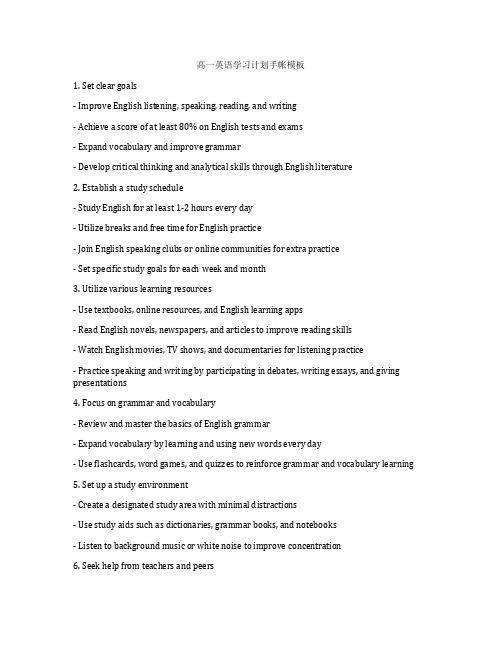
高一英语学习计划手帐模板1. Set clear goals- Improve English listening, speaking, reading, and writing- Achieve a score of at least 80% on English tests and exams- Expand vocabulary and improve grammar- Develop critical thinking and analytical skills through English literature2. Establish a study schedule- Study English for at least 1-2 hours every day- Utilize breaks and free time for English practice- Join English speaking clubs or online communities for extra practice- Set specific study goals for each week and month3. Utilize various learning resources- Use textbooks, online resources, and English learning apps- Read English novels, newspapers, and articles to improve reading skills- Watch English movies, TV shows, and documentaries for listening practice- Practice speaking and writing by participating in debates, writing essays, and giving presentations4. Focus on grammar and vocabulary- Review and master the basics of English grammar- Expand vocabulary by learning and using new words every day- Use flashcards, word games, and quizzes to reinforce grammar and vocabulary learning 5. Set up a study environment- Create a designated study area with minimal distractions- Use study aids such as dictionaries, grammar books, and notebooks- Listen to background music or white noise to improve concentration6. Seek help from teachers and peers- Participate actively in class and ask questions when in doubt- Form study groups to discuss and practice English together- Seek feedback from teachers and peers on written and spoken English7. Monitor progress and adjust study plan- Keep track of test scores, study hours, and learning goals- Reflect on strengths and weaknesses in English skills- Adjust study plan based on progress and areas needing improvement8. Engage in extracurricular activities- Join English clubs, drama clubs, or debate teams for additional English practice- Volunteer for English-related events or activities in the community- Participate in English competitions and contests to challenge and improve English skills 9. Stay motivated and consistent- Set rewards for reaching English learning milestones- Find inspiration from English literature, history, and culture- Stay positive and persistent in the face of challenges10. Review and reflect- Review English notes, assignments, and tests regularly- Reflect on learning experience and identify areas for improvement- Set new goals and create a new study plan for continuous improvement。
英语高一学习计划六篇
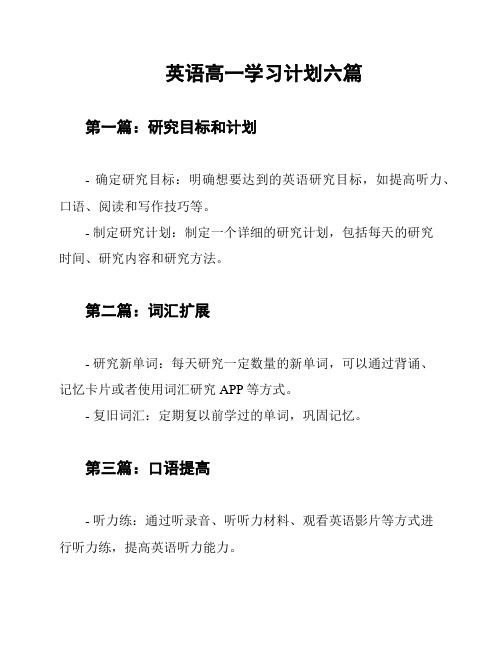
英语高一学习计划六篇
第一篇:研究目标和计划
- 确定研究目标:明确想要达到的英语研究目标,如提高听力、口语、阅读和写作技巧等。
- 制定研究计划:制定一个详细的研究计划,包括每天的研究
时间、研究内容和研究方法。
第二篇:词汇扩展
- 研究新单词:每天研究一定数量的新单词,可以通过背诵、
记忆卡片或者使用词汇研究APP等方式。
- 复旧词汇:定期复以前学过的单词,巩固记忆。
第三篇:口语提高
- 听力练:通过听录音、听听力材料、观看英语影片等方式进
行听力练,提高英语听力能力。
- 口语训练:积极参与英语口语练,可以和同学们组织小组讨论、角色扮演等活动。
第四篇:阅读提升
- 阅读练:每天读一些英语文章、新闻或者故事,提高阅读理解能力。
- 阅读技巧:研究阅读技巧,如快速阅读、扫读、略读等,提高阅读速度和理解能力。
第五篇:写作技巧
- 模仿写作:研究优秀的英语文章,模仿其写作风格和表达方式,提高写作水平。
- 练写作:每天进行一些写作练,比如写作文、作文批改等,提高写作技巧和语法运用能力。
第六篇:考试准备
- 模拟测试:定期进行英语模拟测试,熟悉考试形式和要求,找出自己的不足之处。
- 复总结:对学过的知识进行复总结,做好笔记,为考试做好准备。
以上是英语高一学习计划的六篇内容,希望能够帮助你制定一个合理的学习计划,提高英语学习效果。
祝你学习进步!。
高一学习时间分配计划

高一学习时间分配计划作为高一学生,学习时间分配是非常重要的一件事情。
在这个阶段,学生们面临着更加复杂的学习内容和更高的学习压力。
如何合理地安排学习时间,提高学习效率,是每个高一学生都需要认真思考和调整的问题。
一、从整体上分配学习时间1.一周总学习时间分配计划星期一至星期五每天早晨7:00-7:40简单的晨读和预习复习。
7:50分上学,晚上7:30-8:30预习,针对自己当天课程的主题,先了解一下大概内容,明确自己的重点,以便在课堂上能有的放矢。
晚上8:30~10:00 做一个学习计划,认真分配第二天的学习任务和复习任务,做好心理和知识准备工作。
周六上午9:00-11:00复习或者预习计划,下午周六下午1:00~3:00 着重复习第一学期的知识点。
三十分钟左右,注意力不容易持久的进行学!晚上6:00-9:00复习或者制定学习计划。
周日上午 9:00-11:30语文复习 11:30-12:30午休 12:30-3:00数学复习 3:00-5:00英语复习,晚上6:00-9:00进行知识点梳理把握。
2.每日总学习时间分配计划星期一到星期五早上 7:00-7:40:晨读、预习上午 8:00-11:30:上课学习中午 11:30-13:30:午休、午饭下午 13:30-16:30:下午学习、作业晚上 18:00-21:00:晚上学习、作业星期六、星期日上午 9:00-11:30:上午学习、复习中午 11:30-13:30:午休、午饭下午 13:30-17:00:下午学习、复习晚上 18:00-21:00:晚上学习、作业二、具体学科学习时间分配1.语文语文是基础学科, 考验对文字、理解能力强弱。
所以要正确掌握语文知识。
每天晚上20:30-21:30适量的时间读点课外书籍,提升自己的语言文字表达能力,并在阅读的过程中逐渐提高自己的表达能力。
2.数学数学是一个需要逻辑性强的学科,每天下午的15:00-16:30 专注的进行数学的学习。
高一英语学习计划手帐排版
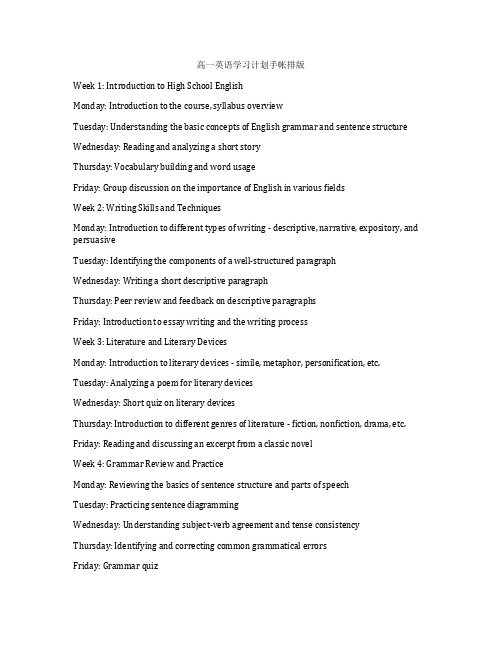
高一英语学习计划手帐排版Week 1: Introduction to High School EnglishMonday: Introduction to the course, syllabus overviewTuesday: Understanding the basic concepts of English grammar and sentence structure Wednesday: Reading and analyzing a short storyThursday: Vocabulary building and word usageFriday: Group discussion on the importance of English in various fieldsWeek 2: Writing Skills and TechniquesMonday: Introduction to different types of writing - descriptive, narrative, expository, and persuasiveTuesday: Identifying the components of a well-structured paragraphWednesday: Writing a short descriptive paragraphThursday: Peer review and feedback on descriptive paragraphsFriday: Introduction to essay writing and the writing processWeek 3: Literature and Literary DevicesMonday: Introduction to literary devices - simile, metaphor, personification, etc. Tuesday: Analyzing a poem for literary devicesWednesday: Short quiz on literary devicesThursday: Introduction to different genres of literature - fiction, nonfiction, drama, etc. Friday: Reading and discussing an excerpt from a classic novelWeek 4: Grammar Review and PracticeMonday: Reviewing the basics of sentence structure and parts of speechTuesday: Practicing sentence diagrammingWednesday: Understanding subject-verb agreement and tense consistency Thursday: Identifying and correcting common grammatical errorsFriday: Grammar quizWeek 5: Research and Presentation SkillsMonday: Introduction to conducting research and using credible sources Tuesday: Choosing a research topic and formulating a research question Wednesday: Using the library and online databases for researchThursday: Organizing and outlining research findingsFriday: Presenting research findings to the classWeek 6: Vocabulary Expansion and Reading ComprehensionMonday: Learning new vocabulary words through context and word roots Tuesday: Practicing using new words in contextWednesday: Reading and comprehending a newspaper articleThursday: Analyzing the author's purpose and point of viewFriday: Group discussion on different interpretations of the articleWeek 7: Creative Writing and ExpressionMonday: Writing a short story or narrativeTuesday: Peer review and feedback on creative writing piecesWednesday: Writing a poem or haikuThursday: Exploring different writing styles and voicesFriday: Sharing and discussing creative writing pieces with classmatesWeek 8: Exam Preparation and ReviewMonday: Reviewing key concepts and skills covered in the past weeksTuesday: Practice exam questions and exercisesWednesday: Mini quizzes on different topicsThursday: Reviewing study strategies and tips for the examFriday: Final examWeek 9: Reflecting and Setting GoalsMonday: Reflecting on the progress and accomplishments made throughout the courseTuesday: Setting personal goals for further improvement in EnglishWednesday: Creating a study plan for continued language developmentThursday: Sharing and discussing personal goals with peersFriday: Celebrating the completion of the course with a reflection partyThe High School English Learning Plan Handwritten Magazine allows students to visually map out their learning journey and track their progress throughout the course. With a focus on interactive activities, group discussions, and creative exercises, students can engage with the material in a meaningful and enjoyable way. This magazine can serve as a useful tool for both students and teachers to monitor academic growth and celebrate achievements in English language learning.。
高一学生英语作业量计划

(1本/月)
每月选择一本适合自己水平的英语书籍进行阅读,并撰写读后感或书评,培养阅读习惯和提高阅读能力
单元测试复习
(/月)
在即将进行单元测试之前,安排学生进行相关知识点的复习和练习,包括语法、词汇、听力和阅读等方面
每学期安排
口语演讲任务
(1次/学期)
进行口语演讲比赛或展示活动,提高学生的口头表达能力和自信心
高一学生英语作业量计划
每周安排
阅读理解与词汇练习
(2次/周)
每次选择一篇适合难度的英语文章进行阅读理解训练,包括问题回答和词汇记忆
写作练习
(1次/周)
每周完成一个写作任务,涵盖不同类型的作文,如叙事、议论、说明等,同时注重语法和表达的准确性
听力与口语练习
(1次/周)
进行听力练习,包括听力材料的听写和理解,同时鼓励学生进行口语练习,可以是朗读、对话或演讲等形式
作文大赛准备
(1次/学期)
帮助学生准备参加作文比赛,指导写作技巧和主题选择,提升学生的写作水平和创造力
注意事项
确保作业量合理,既能够巩固学习内容,又不至于过于繁重影响学生的学习效果和身心健康;鼓励学生在课外进行英语学习,如参加英语俱乐部、观看英语视频、使用英语学习App等方式;保持与学生和家长的有效沟通,及时了解学生的学习情况和困难,调整作业计划以满足学生需求
周末学习计划高一英语笔记

周末学习计划高一英语笔记周末即将到来,虽然是个休息的时间,但是对于高一学生来说,周末也是一个很好的学习时间。
为了提高自己的英语水平,我制定了下面的学习计划:1. 英语阅读首先,我打算花一些时间阅读一本英语小说。
我选择了一本名为《哈利·波特与魔法石》的书,这是一本非常有趣和受欢迎的书籍。
我打算在周末的早上花上两个小时阅读这本书。
通过阅读小说,我可以提高英语的阅读水平,扩大词汇量,了解不同的语法结构,并且提高对英语语境的理解能力。
2. 英语听力接着,我计划找一些英语听力材料,比如英语电影、英语歌曲和英语广播等,在周末的下午进行听力练习。
我会选择一些比较有挑战性的材料,来提高我的听力水平。
在听的过程中,我会逐渐提高对英语的理解能力,并提高我的口语表达能力。
3. 英语写作我还计划在周末的晚上花上一个小时进行英语写作练习。
我会选择一些热门话题,如环境保护、科技发展等,进行一些英语作文练习。
通过写作,我可以提高我的英语表达能力,提高我的写作水平,也可以巩固所学的语法知识。
4. 英语口语最后,我还计划在周末的晚上找一些朋友或同学,进行一些英语口语练习。
可以选择一些英语角活动,或者组织一些小型的英语交流会,和其他同学一起练习口语。
通过与他人交流,我可以更快地提高我的口语表达能力,提高英语的实际运用能力。
总结通过以上的学习计划,我相信我可以在周末更好地利用时间,提高我的英语水平。
我希期通过这样的学习计划,可以更快速地提高我的英语能力,更快地适应高中的学习环境。
这样不断地学习和提高,我相信我可以在未来取得更好的成绩。
- 1、下载文档前请自行甄别文档内容的完整性,平台不提供额外的编辑、内容补充、找答案等附加服务。
- 2、"仅部分预览"的文档,不可在线预览部分如存在完整性等问题,可反馈申请退款(可完整预览的文档不适用该条件!)。
- 3、如文档侵犯您的权益,请联系客服反馈,我们会尽快为您处理(人工客服工作时间:9:00-18:30)。
高一年级英语学习计划表_掌门1对1 随着时间的推移,高一新生即将迎来开学的第一课。
作为一个高中英语学习者,最重要的一课就是熟悉英语学习常规。
我们常说细节决定成败,常规就是细节的具体体现。
学习常规既是学习的指南同时也是学习策略的体现以及学习方法的渗透。
好的学习习惯往往是从常规中开始并逐渐形成的,所以必须给予高度的重视并切实地践行。
以下是我校高一备课组制订的高一英语学习常规,希望能给高一新生在英语学习方面一些具体的帮助和指导。
高一学生英语学习常规
学习时段
基本要求
课前(预习)
1.学习新单词,掌握形、音、义、类、并进行联想记忆;
2.对新课文难点,疑点给予标示(词、句、段);
3.了解单元话题相关的背景知识;
4.尝试归纳各单元语法的基本用法和规则.
课中
1. 专心听讲;勤于思考;
2.认真记笔记(应视重要与否来记,如记重要的搭配、重要句型、词语辨析等);
3.积极参与课堂活动,如举手提问、答问、合作讨论、发言等.
课后(复习)
1.复习当天或单元所学内容(如看或整理笔记,对自己的难点和易错点做特殊标记并保证“回头率”、摘录课本或课外优美的词、句、段落等);善于总结、反思
(所学知识;存在的问题及难点;应如何改进和解决);
2.完成当天的家庭作业;并根据自己实际水平和弱项有计划地补充适当难度的练习(可分阶段侧重);
3.建立错题库(将练习或测试中的错题进行整理,收录到错题库中并就一两道题目进行深刻反思并分析错因和对策);
4.自觉改正写作中的错误,并收集易错、常错词、句;
5.用文件夹或文件袋有条理地整理和收藏练习以及测试卷.
早读/晚读
1.大声朗读课文(正确+流利);记忆或听写单词、词组和基本句型;
2.朗读或背诵优美文句、文段;(可以读写结合)
3.自觉配合老师完成听力练习,听后阅读听错部分的相关内容材料,找出命题角度和难题的设题特点(2011年开始是新题型,听说结合);
4.读英文报纸的新闻等.
测试前
明白考试目的,知道考试范围\内容及要求,做好心理、知识及物质的准备。
测试中
沉着应试,胆大心细,认真审题,先易后难,规范答题,不放过任何一个细节。
要有抢分意识,检查时要从赋分大的题目着手,书面表达尤其不能放过。
测试后
1.冷静总结、反思本次考试成功或失败的原因,找出优势和不足(从知识掌握、答题技巧、应试技巧、答题规范等方面入手);
2.做好错题更正、收集、归类整理工作;
3.整理、改进下一阶段的学习计划及学习方法.
周末
1.梳理当周所学的知识、进行复习;
2.对自己本周的学习表现进行评价(精神状态、学习态度、学习方法、学习成效),并进行阶段计划调整与改进;
3.仿写一篇较高质量的作文并加以朗读;
4.完成3-5篇英语课外阅读文章;
5.有空练好英语书法。
必备本子:1.听写本 2.作文本(2本) 3.错题收集本 4.词句、文段摘录本(读书笔记本) 5.课堂笔记本 6.练字本7.翻译本。
